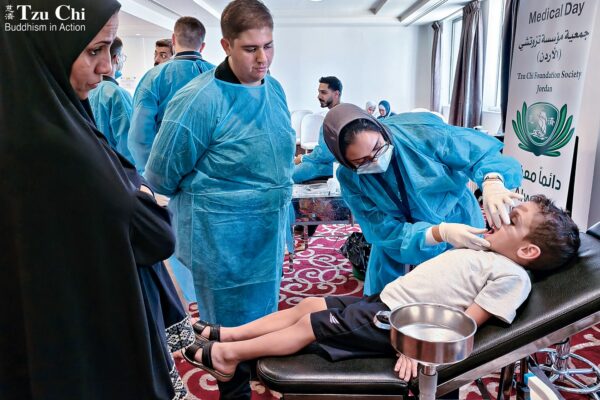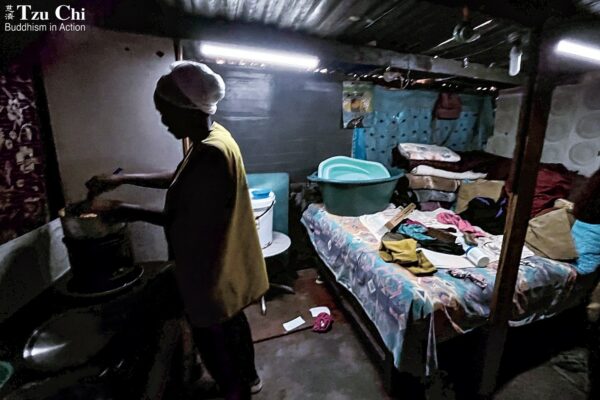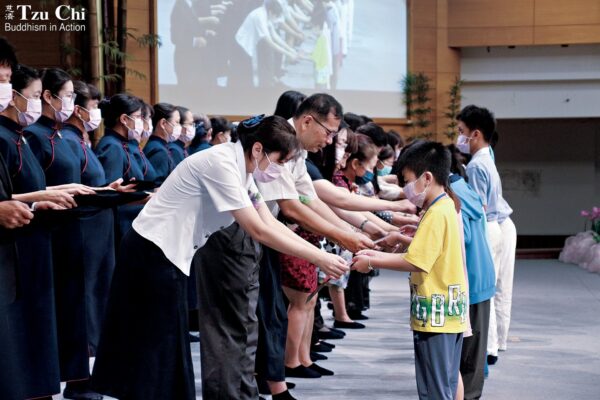By Yeh Tzu-hao
Compiled and translated by Wu Hsiao-ting
Photos by Hector Muniente
Tzu Chi has conducted many distributions for displaced Ukrainians since the war started. Now, as the conflict grinds on, the foundation is working with its partners to implement mid- and long-term aid and support programs for refugees.
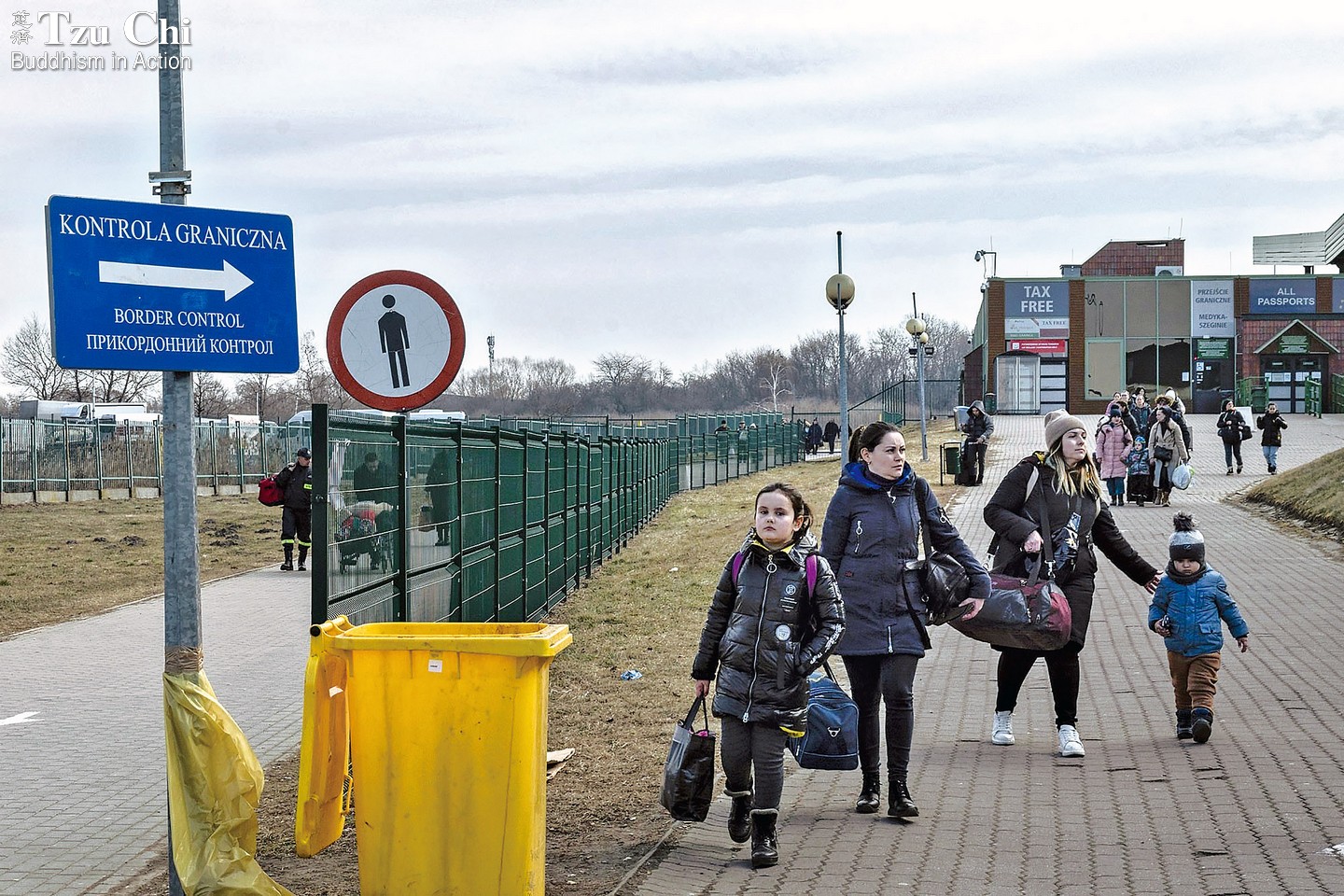
With the threat from the war decreasing, some Ukrainian women in Medyka, southeastern Poland, on the border with Ukraine, take their children on a long journey home.
More than a hundred days have passed since Russia invaded Ukraine in late February 2022. Though heavy fighting continues in eastern Ukraine, the situation has mostly stabilized in other parts of the country. Some Ukrainians who fled to Poland, Moldova, Romania, and other nations have started to return home. According to statistics from the United Nations High Commissioner for Refugees (UNHCR), though more than 7.5 million people had escaped from Ukraine by June 15, 2.4 million had returned.
Returning refugees face many challenges upon their return. “With the exception of the capital Kyiv, water is an issue, whether in western Ukraine or the present war zone,” said Debra Boudreaux (曾慈慧), CEO of Tzu Chi USA. Boudreaux had visited Poland and nearby countries to confer with personnel from several international charitable organizations about implementing humanitarian aid work for displaced Ukrainians. “Several important waterworks and supply systems have been wrecked by missiles. That, coupled with pollution of water sources as a result of warfare, has made water supply one of the toughest challenges faced by Ukrainians.”
The CEO also pointed out several other issues. Civilian residences were destroyed in bombing attacks, forcing those who had lost their homes to temporarily shelter in tents. With agricultural fields reduced to battlegrounds, the cultivation and harvesting of crops has been disrupted. Storing and transporting food has been impacted too. “Food shortages are now a problem, not just in Ukraine, but in nearby countries too,” said Boudreaux. “And the problems will just continue to grow.” The war has even contributed to inflation and food scarcity around the world.
With the end of the conflict hard to predict, several million Ukrainian refugees will continue to stay abroad. Tzu Chi is launching mid- and long-term assistance in response. Besides holding distributions and providing other support for displaced Ukrainians in Poland in cooperation with other non-governmental organizations (NGOs), volunteers also visited Moldova and Romania in May, working to increase the reach of Tzu Chi’s aid.
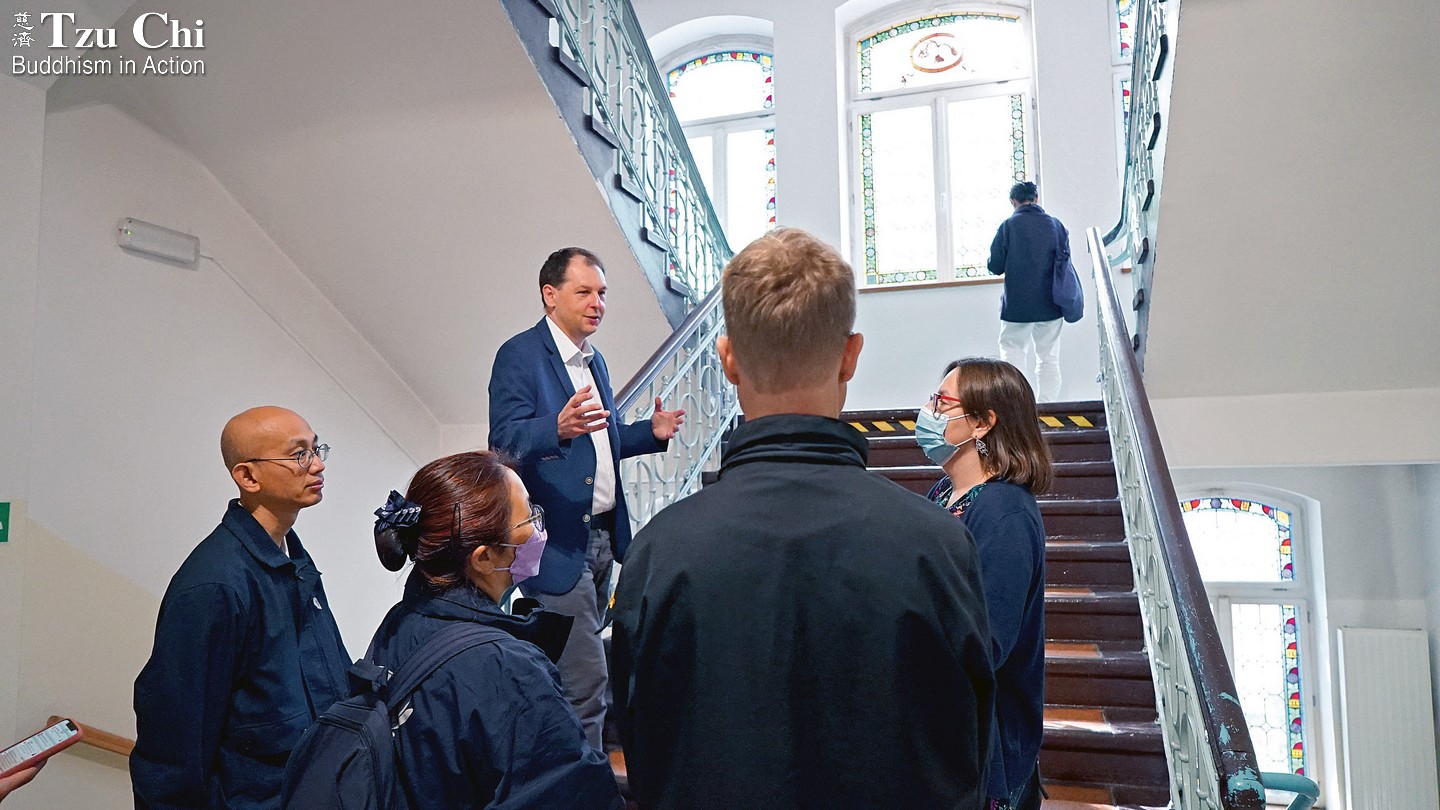
A Tzu Chi team visits St. Camillus Hospital of Tarnowskie Góry, near Kraków, Poland, which has taken in terminally ill Ukrainian refugees. Courtesy of Tzu Chi USA
Food, shelter, and emotional support
Debra Boudreaux explained that Tzu Chi has no office yet in Ukraine and Poland, but the foundation can still get its aid to the front lines by cooperating with other international organizations. She believed this is the biggest breakthrough for Tzu Chi’s relief mission this time. She also said that she has learned a lot from these organizations—things that can help Tzu Chi render aid in the future.
One of the organizations is Camillian Disaster Service International (CADIS), with which Tzu Chi has signed a memorandum of cooperation. CADIS is a non-profit organization owned by the Order of the Ministers of the Infirm (Camillians), a Roman Catholic religious order. Tzu Chi has started working with that organization to help Ukrainians. The collaboration includes providing food, other basic necessities, medical services, psychological counseling, and temporary housing. The goal is to help more than 40,000 people over five months.
The CEO said that when she and others from Tzu Chi visited Warsaw Central Station in April, they saw a service station in the lobby set up by the Camillian Mission of Social Welfare (referred to as “the Mission” below). They had also erected two tents outside the station, one to provide daily necessities such as toiletries or food packages, and the other to provide hot food. Any Ukrainian refugee who could produce identification could access the services.
Aside from the service station at Warsaw Central Station, the Catholic organization has also set up service centers at train stations in Moldova and Romania. These locations are major transfer points for Ukrainians as they travel to other countries or cities. The Camillian service centers also provide a platform for companies, social welfare organizations, and warm-hearted people to offer telecommunication services, food, and other necessities to displaced Ukrainians. They help bring peace of mind to the refugees and order and stability to communities.
The Tzu Chi team also visited facilities offered by the Camillian Mission of Social Welfare to serve as shelters for displaced Ukrainians. For example, a place run by the Mission for street people had taken in some Ukrainian mothers and children. Most of the mothers were wary of the visiting Tzu Chi volunteers, perhaps due to the trauma of war. The children, perhaps out of their natural curiosity, warmed quickly to the visitors.
Though the trauma these mothers carried was not easy to see on the surface, Boudreaux knew the pressure they must have been under. “Many said they were proud of their husbands or sons for defending their homeland in Ukraine.”
The Ukrainians who have fled their country need more than material aid—they need psychological consolation too. Tzu Chi volunteers went with some Ukrainian mothers who were participating in a Tzu Chi work relief program to visit another Camillian facility, located in Łomianki, about 20 minutes’ drive from the city center of Warsaw. They came to conduct group activities for some Ukrainian women and children sheltering there.
“Head, shoulders, knees, and toes….” Anastasia Malashenko, who had been serving as an emcee in Tzu Chi distributions, led adults and children in getting some exercise. In the next room, some preschool-age children, under the guidance of other volunteers, were tracing their fingers on colored paper to be made into flowers. When they had completed their handicrafts, they presented them as gifts to their mothers, who had endured so much heartache as they fled with their children from their home country.
In addition to the service station at Warsaw Central Station and the two refugee shelters, the Tzu Chi team also visited a Camillian hospital near Kraków, the second largest city in Poland. The hospital is more than a hundred years old, and has 60 beds. Twenty of them were being used by terminally ill Ukrainian refugees receiving palliative care. “They couldn’t go to a typical shelter for Ukrainian refugees, so the Camillian hospital took them in. At least they have a roof over their heads to preserve their dignity during the final days of their lives,” Boudreaux explained.
Most Ukrainians are Orthodox Christians, so Christian organizations like CADIS can offer spiritual support in addition to food, clothing, and shelter. That said, though Tzu Chi is a Buddhist organization, volunteers believed that with sincerity and love they could also bring a lot of warmth to refugees’ hearts.
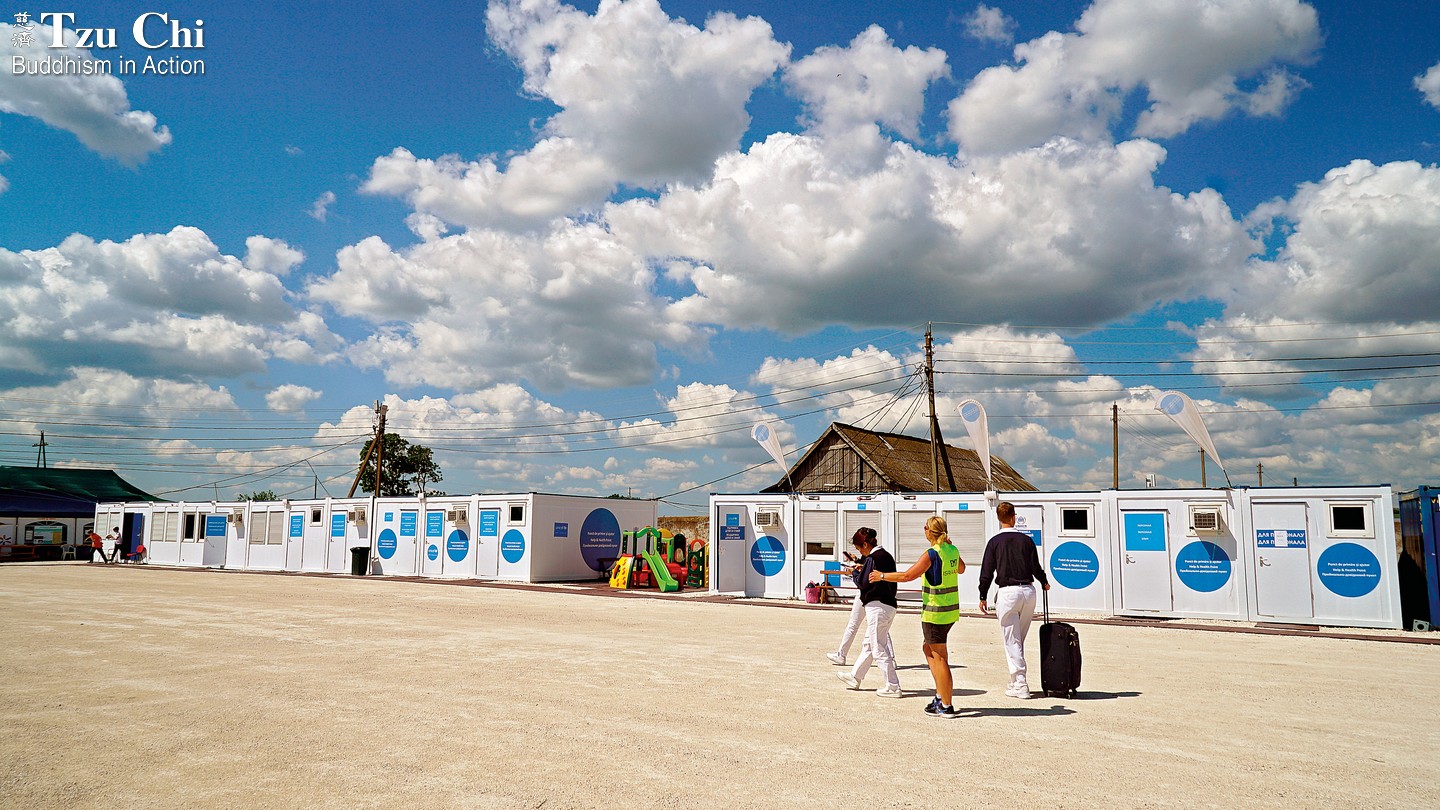
A UNICEF Blue Dot hub in Palanca, Moldova
UNICEF
Another organization Tzu Chi has joined hands with is the United Nations Children’s Fund (UNICEF). The two sides have entered into an agreement with the plan to provide help to 15,000 Ukrainian families over a period of six months, including schooling for children, physical and mental care, and providing food and other necessities.
“What impressed me most about UNICEF was that they have established a whole set of standard operating procedures, borne from years of experience,” said Boudreaux. “For example, in Poland, they first talked with the ministries of education, internal affairs, foreign affairs, etc. Then they went back to the towns or villages that had taken in displaced Ukrainians and interacted with the local governments. Each town and village had their say in things and were included in the decision-making process.” After talking to UNICEF personnel, Boudreaux realized even more how helping refugees is a long-term, difficult mission.
Almost all the places in the world that are hosting refugees have Blue Dot hubs in them. Jointly established by UNHCR and UNICEF, along with local authorities and partners, Blue Dot hubs are safe spaces that provide refugee children and families with critical information and services. Besides food and shelter, such hubs offer legal aid, counseling and psychosocial support, and family reunification services to restore and maintain contact among family members, among other services.
Boudreaux visited several Blue Dot hubs and saw how their activity space for children was arrayed with all kinds of toys and stationery. With the help of trained staff, children were undergoing play therapy, a form of therapy that uses play activities to help children through mental and emotional issues.
“It’s not uncommon for the trained staff to suffer trauma themselves, after hearing sad stories every day—about war, about the painful journeys of fleeing from one’s home country, about human trafficking,” Boudreaux said. “So Blue Dot hubs offer counseling to their own workers too.”
Similar to work relief programs offered by Tzu Chi and other organizations to help refugees support themselves, UNICEF employs refugees to assist with their work too. For example, they have hired professionals from Ukraine, including teachers, doctors, and nurses. After training, they are put to work providing psychological counseling and other services for refugee children and women in Poland, Moldova, Romania, and even Ukraine. The scale of the project is large and many have benefited, but there is still a long way to go.
“When people have experienced a trauma, seeing the doctor just once or having a single counseling session isn’t enough to help them recover,” Boudreaux explained. “You are not going to see instant results. A lot of time and patience is required for this type of work.”
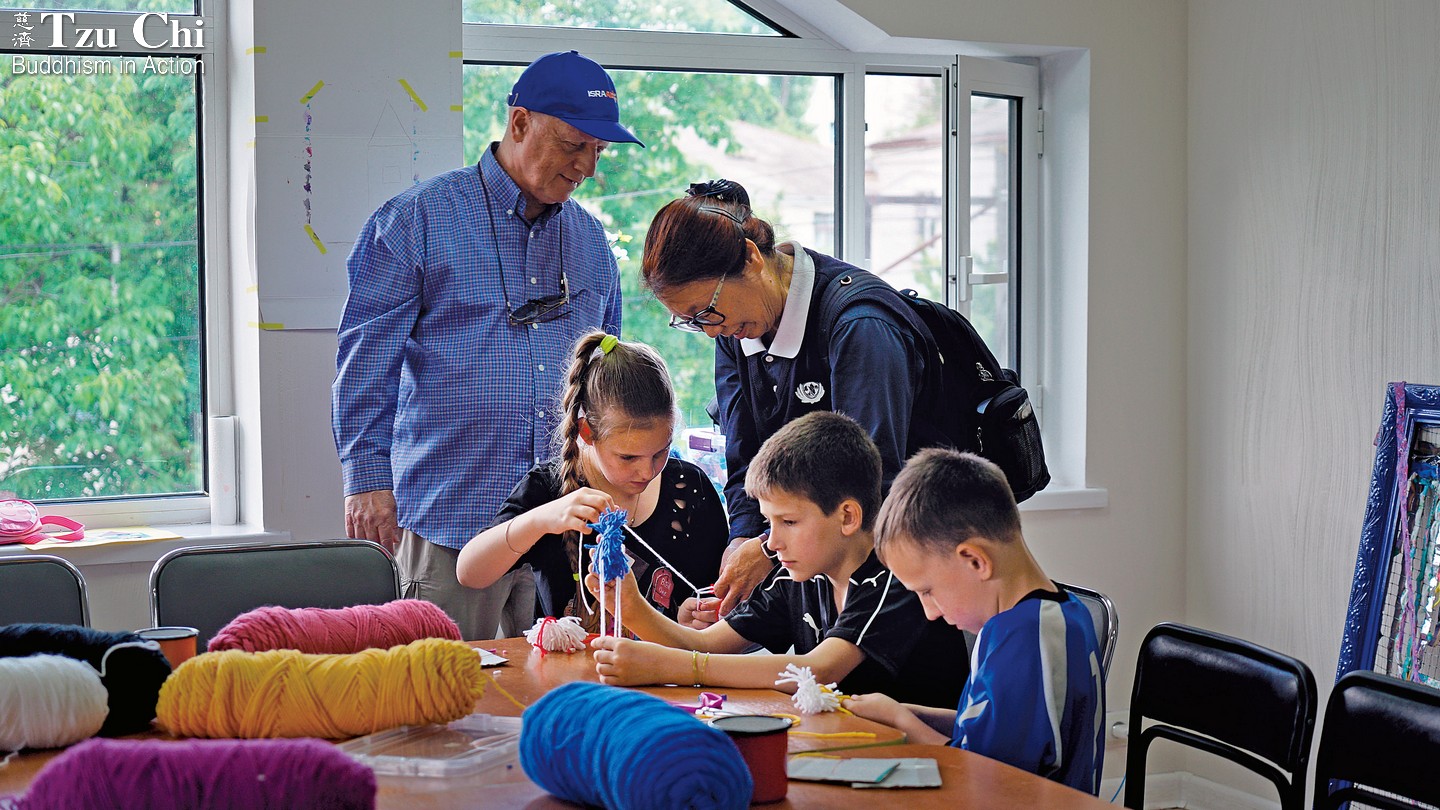
Tzu Chi is collaborating with IsraAID to provide psychosocial care at seven support centers in Moldova for children and mothers from Ukraine.
Logistics
Healing the mind can’t be rushed but providing aid supplies is something that can’t wait. That’s why Tzu Chi has also combined efforts with IsraAID, a humanitarian NGO based in Israel, to get its aid to Ukrainian people. IsraAID is known for its capacity for organizing and managing logistics.
“The organization uses a specialized software program to collect information, say, from hospitals in Ukraine about the supplies they need,” Boudreaux explained. “Then they compile a list of the needs, and contact NGOs in France, Germany, America, and other countries to inform them what supplies are needed by which hospitals. They also help donated goods get to the right place.” The Humanitarian Logistics Hub IsraAID created in Tulcea, Romania, in partnership with local NGOs and authorities after the Russia-Ukraine war broke out, is playing an important role in streaming and facilitating aid donations during the war.
In order to get supplies donated by Tzu Chi into the “humanitarian corridor” in Ukraine, Debra Boudreaux visited IsraAID personnel in Romania and Moldova. After the war started, IsraAID quickly set up the large logistics hub in Tulcea to allow trucks carrying supplies from Europe to unload there. Then staffers sort the goods before sending them to southern and eastern Ukraine. By working with IsraAID, Tzu Chi has been able to get its food packages, medical kits, medicine, and signature eco-blankets into Odessa, Kharkiv, and other areas in Ukraine.
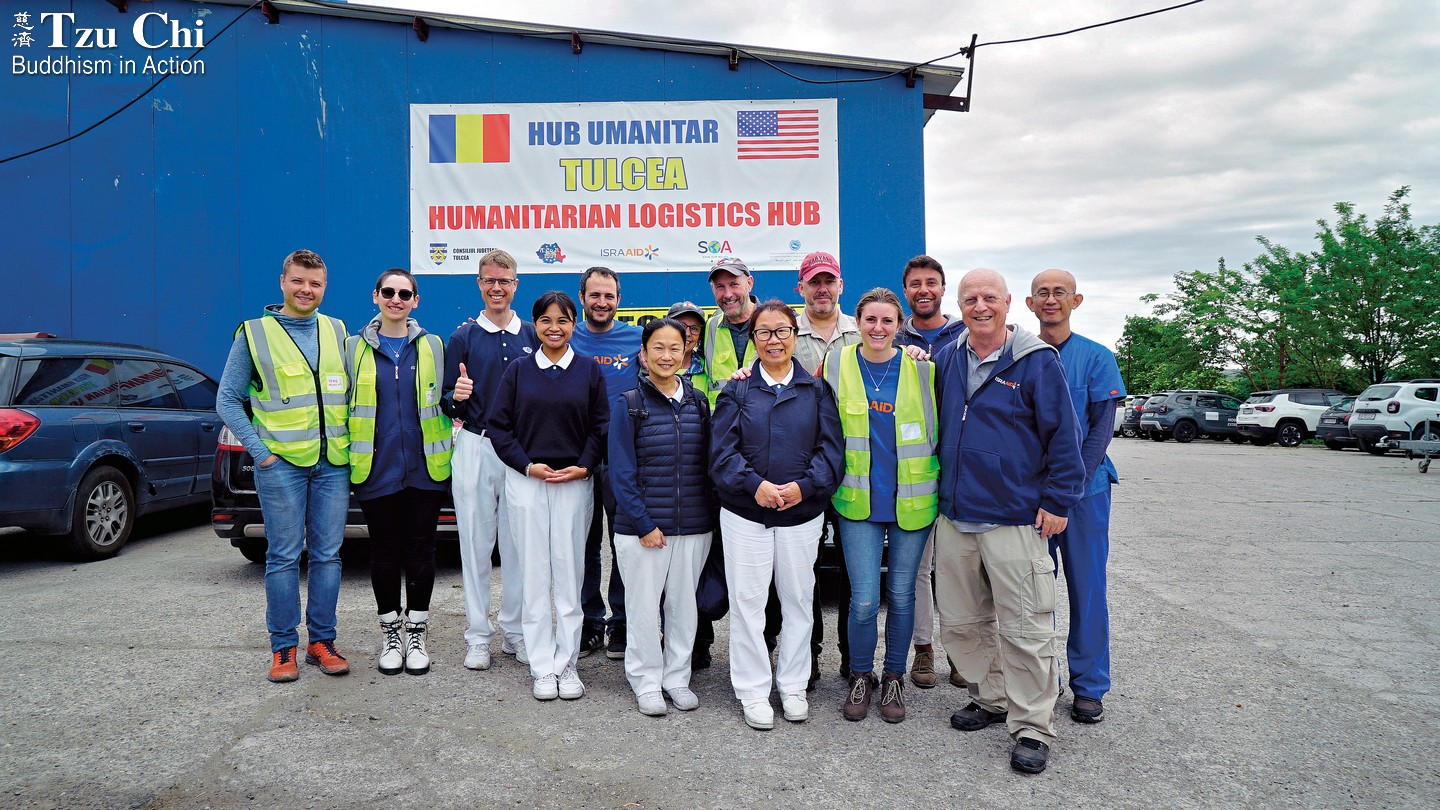
A Tzu Chi team poses with staffers from IsraAID at the Humanitarian Logistics Hub that IsraAID and its partners established in Tulcea, Romania, after the outbreak of the Russia-Ukraine war. Tzu Chi has joined hands with IsraAID to get the foundation’s aid supplies into Ukraine.
A long road ahead
“It’s impossible to ask a child who has experienced a trauma to quickly recover,” Boudreaux reiterated. “It takes time to help the refugees emerge from their painful experiences.” She pointed out that the war is not over yet, and that the road to reconstruction will be longer than everyone imagines. Tzu Chi won’t be absent on the road.
Besides providing material aid, the foundation’s distinctive culture has played an important role in bringing encouragement to those who have received help from Tzu Chi.
“This is what Dharma Master Cheng Yen has always reminded us to do,” said the CEO. “In the process of bringing relief to others, we shouldn’t just focus on giving, but should also try to inspire people to pay forward the love they receive.” She commented that is why volunteers during the distributions have encouraged Ukrainian refugees to donate via Tzu Chi’s signature coin banks to help their fellow compatriots. “‘When the journey is long, one knows the strength of the horse,’” Boudreaux said, quoting a well-known Chinese saying. “A lot of patience will be required in our future work as we accompany the suffering people through this difficult time. We’ll continue to work with like-minded organizations to pull off the humanitarian aid effort this time.”
In addition to CADIS, UNICEF, and IsraAID, Tzu Chi has also signed collaboration agreements with Airlink, Adventist Development and Relief Agency International, World Hope International, and other organizations to broaden the scope of the foundation’s assistance. Yen Po-wen (顏博文), CEO of the Tzu Chi charity mission, said: “An individual’s strength might be limited, but if we work together, we’ll be able to help all those who need a hand. At the same time, we hope that the war will end soon so that those displaced by the conflict will be able to return to their homeland and restart their lives in peace and safety.”

 Zoom in picture)
Zoom in picture)